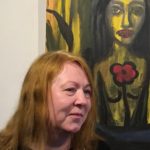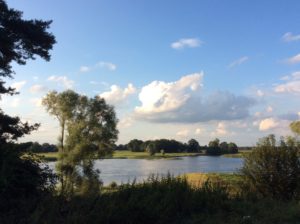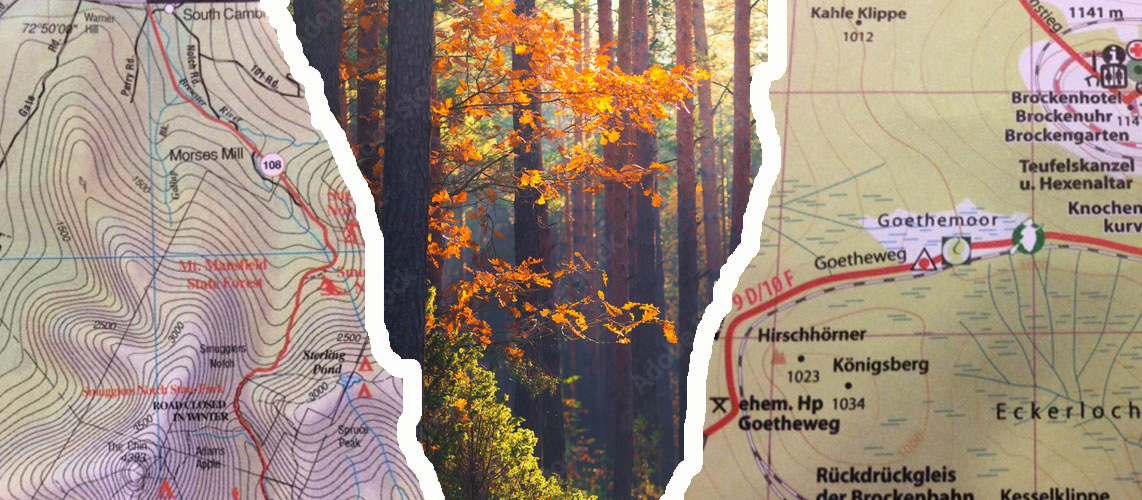
Earlier this year, the German word Heimat made it into the New York Times. Heimat means home, homeland, or place of belonging – straightforward enough, you might think. But these are not straightforward times, which is why the word made it into the New York Times, and why Germany now has a Heimat minister, and why it is at times difficult to talk about Heimat without ending up in an intense political discussion.
Heimat is also one of the themes in my explorations along the former border between East and West Germany. As part of my conversations with people I met there, I sometimes asked my conversation partners to share what Heimat means to them. Here is what Britta Kowalski wrote to me later:
Heimat
I always wanted to travel and see the world. This does not seem an unusual thing to wish for – but for the fact that I was born in 1964 in the German Democratic Republic, the GDR, the first working-class and peasant state on German soil, as it called itself, and here was the Wall, and the installations on the inner German border.
I began learning languages early. My first dictionary was a bunch of yellowed pages with lists of Russian words belonging to my paternal grandfather. They were among his personal belongings which had been sent to my grandmother after he had died in a military hospital in Poland.
From the 5th grade we learned Russian at school, from the 7th English.
That was not enough for me. Western television, more specifically the 3rd NDR program, brought a Spanish course every Saturday morning, and there I always was, with a notebook, pen and tape recorder.
Studying agricultural sciences in Rostock opened up the minute possibility of research abroad. I graduated earlier to attend an intensive Spanish course at the university. I learned laboratory techniques and prepared plant material in-vitro, hundreds of test tubes with small potato plantlets growing in them.
My eyes were fixed only on the distance, as if wearing blinders; sometimes I even held my breath.
There was still a long way to go until I took my seat in the Interflug plane.
It was only later that I realized how my professor held his protective hand over me, which was necessary, because I was not a member of the ruling Socialist Unity Party of (East) Germany, SED, and I did not preface my diploma thesis, on the susceptibility of the potato to mechanical damage, with the customary political statement. This was not an act of rebellion; the truth is that I was unable to internalize the necessary phrases because to me the slogans seemed mere hollow din. It was a coincidence that my Stasi file at the university contained no information about my “border action” more than 10 years earlier; at that time there was no such thing as digital networking. Later, when I gained access to my Stasi file, I realized that the person informing on me was concealing anything that would have hurt my chances, and only reported that I was attached to my family and travelled home every weekend. So, I was never suspected as a potential “refugee from the republic.”
Then the time came. There I stood with my feet in the white sand of a Caribbean beach, the warm air like an embrace, the unlikely blue of the sea in front of me, more a condition than a color, above me the wild red-orange blossoming of the tulip tree, and the rustling of the palm fronds. And I thought, I’ll just stay, from here I’ll never go away again.

The moment this thought passed through my mind, I already knew that it was completely wrong. That I would always return to my family, to our house, which because of the scarcity of building materials was only holding up with love, to my little village, where everyone knew each other, to this lonely landscape in the Elbe-Urstromtal (glacial river valley), halved by the border fence.
This border fence, erected three meters high of expanded metal with barbed wire on top: I never got used to the sight of it, not a day of the more than 20 years that the thing stood.
Then the border opened, my little village was no longer the end of the world, but in the middle of Germany.The GDR citizens could finally travel.I worked and researched in Ireland, Chile, Peru, South Africa, Angola, Ethiopia. And I always came back home.The idea of staying somewhere else never crossed my mind again.And at last, finally, I did not want to travel anymore.
Britta’s “border action” will be covered in the book…stay tuned!

A very powerful post, Kerstin. Thank you!
Thank you Julie!
Kerstin,
a very touching biography by Britta Kowalsky.
[…] Silke Kowalski’s daughter Britta, who was equally generous to me, shared her reflections on Heimat in the previous post. […]
[…] If you missed this post in English, you can find it here. […]
Britta’s story is peaceful and wise with her perspective from this time. In our world there are so many tens of millions of lives distressed by heimatlos, the loss of their homes and homeland due to displacement by crime and violence. The United Nations High Commissioner for Refugees is the Heimat Minister for the World but faces a seemingly impossible task. What can we learn from the end of the dividing wall and fences in Germany that will help the world to heal its sans terre migrants, to help them feel at home anywhere? Or at least somewhere?
Thank you for your thoughts, Dick! I like your description of the UN High Commissioner for Refugees’ job as Heimat Minister for the World. Yes, that seems to be one of the big questions of our time – how to help refugees feel at home somewhere else, and to the extent possible, reduce the causes of migration (in the sense of fleeing dangerous or unbearable circumstances – the German word Fluchtursachen is more precise in this).